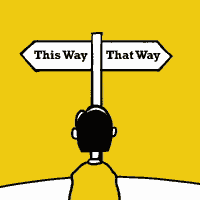
Environmental education helps learners of all ages develop critical and creative thinking skills that lead to informed decision making. Environmentally literate citizens are constantly challenged to use and improve their critical and creative thinking skills and environmental education can help focus on thoughtful questioning, logical thinking skills, and creating new solutions to the challenges we face.
Transcript:
I'm John Fraser, a conservation psychologist and architect. I'm the president and CEO of New Knowledge Organization, a think tank that focuses on how people get involved in positive social change.
Informed decision-making involves critical thinking. It uses the weight of evidence and ideas around you. You make decisions that weigh the moral costs, legal costs, as well as the scientific information to make a decision about the best possible path to follow.
If we made informed decisions about everything in our lives, we'd never get out of bed because there are too many micro-decisions that we do by habit. So we make informed decisions in elections. We make informed decisions when we choose to do something that we haven't done before. Otherwise, we follow patterns. Those are not necessarily informed decisions. When we think about environmental behaviors, many of the environmental behaviors people get involved in aren't necessarily informed decisions, and they aren't necessarily bad. People recycle today, but they recycle because everyone in their neighborhood recycles they aren't necessarily making an informed choice.
Informed decision-making is triggered by recognizing the moral values are counter to what we see happening in front of us and that we feel confronted. But it has to be coincident with knowing what I can do and knowing what the outcome is going to be. So I can act distressed today, but if I don't know what to do, I won't take an action.
When we hope to see informed decision making we have to recognize that working toward environmental conservation is like treating cancer. One education treatment is not going to solve the problem. Because just like one cancer treatment, one radiation treatment is not going to solve the problem. In order for us to move towards a change in society or informed decision-making, people need a weight of evidence. They need to rely on comparisons.
So when we do work with people in an environmental education setting, we're entering into a conversation midpoint. They brought information to the table across their life experience, and they are going to negotiate how what you're saying fits into that larger world.
So if we think about something like changing your energy supply to a wind source or a renewable energy source, likely people will look at the news, the information put out by corporations that they likely don't trust, and then they'll go out and talk to their friends. So they're sampling and they weigh their evidence toward what people they trust in their community, their pastor, their best friend, or in their family, someone who has the expertise that they can rely on. So they're more likely to rely on a cousin or uncle or aunt or best friend who is involved in the field, who does environmental conservation or environmental education in their volunteer time, to recommend to them what they might choose to do.